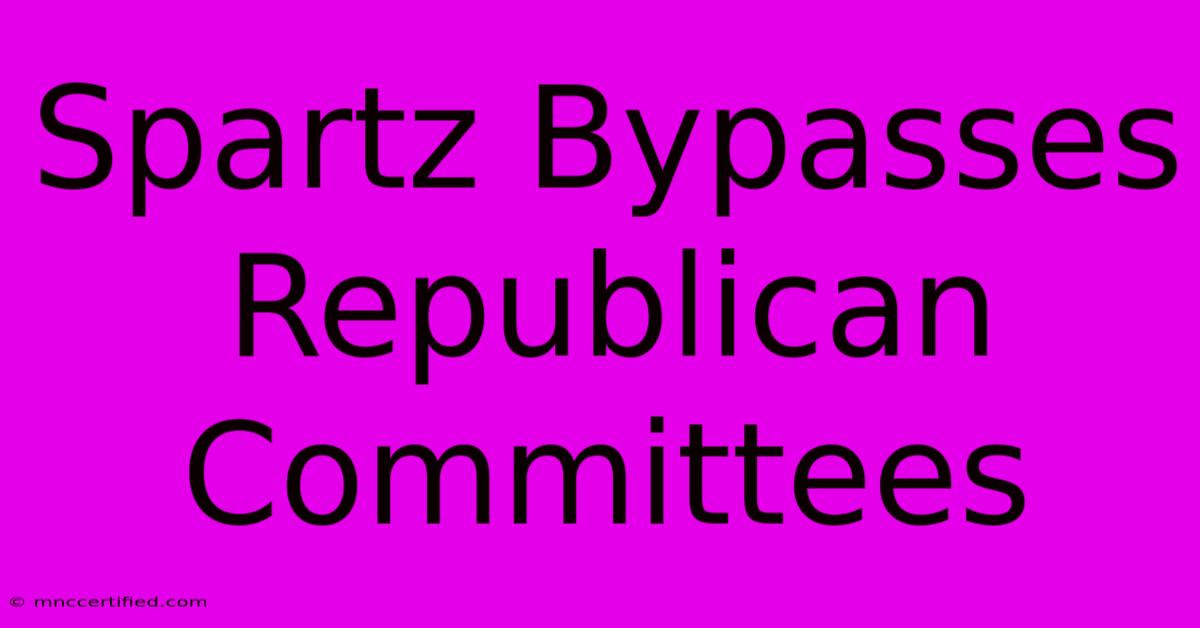Spartz Bypasses Republican Committees

Table of Contents
Spartz Bypasses Republican Committees: A Deep Dive into the Controversy
The recent actions of Representative Victoria Spartz, bypassing established Republican committees to directly engage with Ukrainian officials, have sparked significant controversy within the Republican Party and beyond. This article delves into the details of this situation, exploring the motivations, implications, and potential consequences of Spartz's actions.
Understanding the Context: Spartz's Relationship with Ukraine
Representative Spartz, a Republican representing Indiana's 5th congressional district, holds a unique perspective on the ongoing conflict in Ukraine. Born in Ukraine, she possesses firsthand knowledge and personal connections to the country, influencing her outspoken support for Ukraine and its fight against Russian aggression. This background, however, also adds a layer of complexity to her recent actions.
Bypassing Established Channels: The Core of the Controversy
Spartz's direct engagement with Ukrainian officials, bypassing established Republican committees responsible for foreign policy, is the primary source of the ongoing debate. Critics argue that her actions undermine party unity and established protocols, potentially compromising sensitive information and strategic decision-making processes. This circumvention of official channels raises concerns about transparency and accountability.
Motivations: Transparency or Disruption?
Spartz has publicly defended her actions, citing concerns about transparency and efficiency within the existing system. She argues that her direct engagement allows for a more immediate and effective response to the evolving situation in Ukraine. However, her critics contend that her actions are a deliberate attempt to disrupt established party lines or pursue a personal agenda. The lack of complete transparency surrounding her communications with Ukrainian officials fuels this skepticism.
Implications and Potential Consequences
The implications of Spartz's actions are far-reaching. They extend beyond internal party politics and have potential consequences for:
Impact on US-Ukraine Relations:
Spartz's actions could complicate US-Ukraine relations, particularly if her independent engagement is perceived as undermining official US policy or creating inconsistencies in messaging. Maintaining a unified approach is crucial for effective support of Ukraine.
Damage to Republican Party Unity:
The controversy has created internal divisions within the Republican Party, highlighting existing tensions between different factions. This internal strife could weaken the party's ability to present a united front on critical foreign policy issues. The erosion of trust and cohesion within the party is a significant consequence.
Questions of Ethics and Protocol:
The incident has raised broader questions about the ethics and protocol surrounding congressional engagement with foreign governments. Clear guidelines and procedures are essential to prevent similar situations from arising in the future.
The Future of Spartz's Role in Ukraine Policy
The long-term impact of Spartz's actions remains to be seen. Her future role in shaping US policy towards Ukraine is uncertain, depending on the response from both Republican leadership and the Ukrainian government. The situation requires careful navigation to mitigate further damage and restore trust.
Conclusion: A Complex Issue with Broader Implications
The case of Representative Spartz bypassing Republican committees to engage directly with Ukrainian officials is a multifaceted issue with significant implications. While her motivations may stem from a desire for efficiency and direct impact, her actions raise serious concerns about party unity, transparency, and established protocols. The ongoing controversy underscores the need for clear guidelines and open communication within the political system to manage sensitive international relations effectively. Further investigation and dialogue are crucial to fully understand the extent of this controversy and its lasting consequences.

Thank you for visiting our website wich cover about Spartz Bypasses Republican Committees. We hope the information provided has been useful to you. Feel free to contact us if you have any questions or need further assistance. See you next time and dont miss to bookmark.
Featured Posts
-
Real Madrid Vs Chelsea Womens Champions League
Dec 18, 2024
-
Chelseas Mudryk Fails Drugs Test
Dec 18, 2024
-
Honda And Nissan Merger Talks
Dec 18, 2024
-
Barton Faces Malicious Communications Charges
Dec 18, 2024
-
Cagliari Vs Juventus Coppa Italia Live Thread
Dec 18, 2024